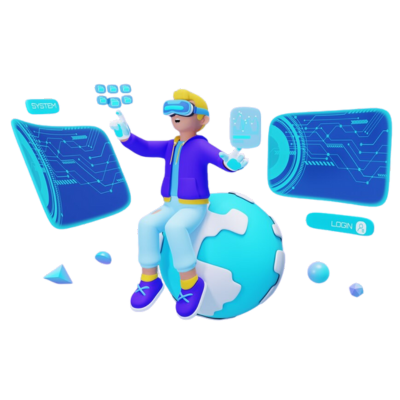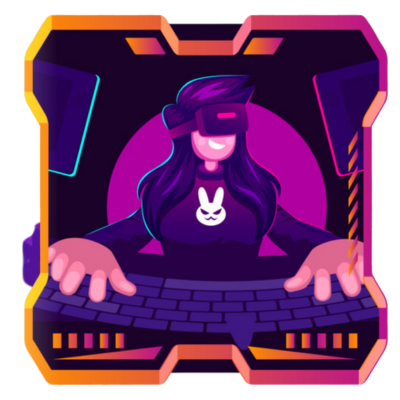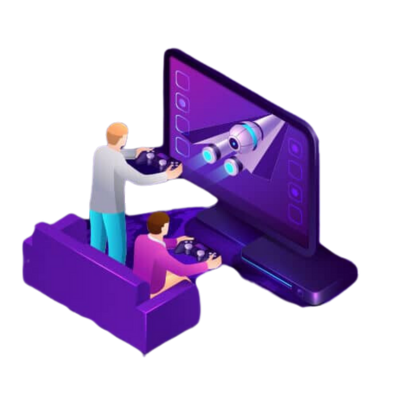Introduction
Web3 Game Development Company
Work with a leading Web3 game development company to create the future of gaming.

Understanding Web3 Games
What Are Web3 Games?
The Core Principles of Web3 Gaming
The core principles of Web3 gaming revolve around decentralisation, transparency, and player empowerment. In a Web3 game, no single entity has control over the game’s economy, governance, or data. Instead, these aspects are managed through decentralised protocols, smart contracts, and community-driven decision-making. This ensures that Web3 gamers have a say in the game’s development and can trust that the game’s rules are enforced fairly and transparently. Additionally, Web3 games offer interoperability, allowing players to transfer their assets and identities across multiple games and platforms.
Technical Advancements Driving Web3 Games
Blockchain Technology
At the heart of Web3 games is blockchain technology, which provides the foundation for decentralized and secure gaming experiences. A blockchain is a distributed ledger that records all transactions across a network of computers. This ledger is immutable, meaning that once a transaction is recorded, it cannot be altered or deleted. This feature is crucial for ensuring the integrity of in-game assets and transactions in Web3 games. Web3 game developers use blockchain to create a transparent and tamper-proof record of all in-game activities, from asset ownership to gameplay outcomes.
Smart Contracts
Smart contracts are self-executing contracts with the terms of the agreement directly written into code. In Web3 games, smart contracts automate various processes, such as in-game transactions, rewards distribution, and governance voting. For example, when a player purchases an in-game item as an NFT, a smart contract automatically transfers ownership of the item to the player’s digital wallet. This automation eliminates the need for intermediaries and ensures that transactions are executed fairly and transparently. Web3 game development companies rely on smart contracts to create trustless and decentralised gaming environments.
Non-Fungible Tokens (NFTs)
NFTs are a key component of Web3 games, enabling true ownership and transferability of in-game assets. Unlike traditional digital assets, which are controlled by the game developer, NFTs are stored on a blockchain and owned by the player. This means that players can buy, sell, and trade their in-game items outside the game’s ecosystem, creating a vibrant secondary market. NFTs also provide a new way for players to monetize their gaming experiences, as rare and valuable items can be sold for cryptocurrency or other digital assets. Web3 game platforms are built to support NFT creation and trading, offering players a seamless and integrated experience.
Decentralized Autonomous Organizations (DAOs)
Web3 games often incorporate decentralised governance models through Decentralised Autonomous Organizations (DAOs). A DAO is an organisation governed by smart contracts and run by its members, who hold voting power based on their ownership of a specific token. In a Web3 game, a DAO can be used to make decisions about game development, updates, and community initiatives. This democratic approach ensures that the game’s development is aligned with the interests of its players, rather than being dictated by a central authority. Web3 development companies are increasingly incorporating DAOs into their game design platforms to enhance player participation and engagement.
The Benefits of Web3 Games
True Ownership of In-Game Assets
One of the most significant advantages of Web3 games is that players have true ownership of their in-game assets. In traditional games, players may spend significant time and money acquiring items, but they do not actually own them—the developer does. This means that if the game shuts down or the developer changes the rules, players could lose everything. In contrast, Web3 games use NFTs to give players full control over their assets, which are stored on the blockchain and can be transferred, traded, or sold at any time. This shift in ownership dynamics is a game-changer, as it empowers players and provides them with new opportunities to monetize their gaming experiences.
Interoperability Across Games and Platforms
Web3 games are designed with interoperability in mind, meaning that assets and identities can be used across multiple games and platforms. This is made possible through the use of standardised blockchain protocols, which ensure that NFTs and other digital assets are compatible across different environments. For example, a character or item earned in one Web3 game can be transferred and used in another, provided both games support the same standards. This level of interoperability is unprecedented in the gaming industry and offers players a more seamless and integrated experience. Web3 gaming companies are leading the way in developing interoperable games that break down the barriers between different gaming ecosystems.
Decentralized Governance and Community Involvement
Web3 games priorities decentralized governance, allowing players to have a direct say in the game’s development and direction. Through DAOs and other decentralized governance models, players can vote on key decisions, such as new features, updates, and community initiatives. This level of involvement fosters a sense of ownership and investment among players, as they are no longer passive consumers but active participants in the game’s evolution. Web3 game development companies in the USA and India are embracing this approach, creating games that are shaped by the community rather than by a central authority.
Enhanced Security and Transparency
Blockchain technology provides a higher level of security and transparency compared to traditional gaming platforms. In Web3 games, all transactions and game activities are recorded on the blockchain, creating an immutable and tamper-proof record. This ensures that players can trust the integrity of the game and that their assets are secure. Additionally, smart contracts automate key processes, reducing the risk of fraud or manipulation. Web3 game development firms are focused on building secure and transparent platforms that protect players’ assets and data
New Monetization Opportunities
Web3 games offer players new ways to monetize their gaming experiences. Through NFTs and play-to-earn models, players can earn cryptocurrency or other digital assets by participating in the game. This creates a more rewarding experience, as players can generate real value from their time and effort. For example, a player might earn a rare NFT by completing a challenging quest, which can then be sold on a decentralised marketplace for a significant sum. Web3 game platforms are designed to support these monetization opportunities, providing players with a variety of ways to earn and trade assets.
Web3 Game Development Services
Work with a leading Web3 game development company to create the future of gaming.

The Role of Web3 Gaming Companies in Shaping the Future
Leading the Development of Web3 Games
Web3 gaming companies are at the forefront of developing and launching Web3 games that push the boundaries of what’s possible in online gaming. These companies are leveraging blockchain technology, NFTs, and decentralized platforms to create innovative games that offer players new levels of ownership, engagement, and monetization. Web3 game development companies in the USA and India are particularly active in this space, building games that appeal to a global audience. By focusing on player empowerment and community-driven development, these companies are setting the standard for the future of online gaming.
Building Web3 Game Design Platforms
In addition to developing individual games, Web3 gaming companies are also building platforms that enable other developers to create and launch their own Web3 games. These platforms provide the tools and infrastructure needed to build decentralised games, including blockchain integration, NFT creation, and smart contract deployment. By lowering the barriers to entry, these platforms are democratising game development and encouraging innovation. Web3 development firms are playing a crucial role in this process, offering Web3 game development services that help developers bring their ideas to life.
Curating the Best Web3 Games
As the Web3 gaming ecosystem continues to grow, there is a need for curation to help players discover the best Web3 games. Web3 gaming companies are stepping up to fill this role, creating platforms and marketplaces that showcase top Web3 games and digital collectibles. These platforms provide players with a curated list of games that meet certain standards of quality and innovation, making it easier for players to find games that align with their interests. By curating the Web3 games list, these companies are helping to elevate the entire ecosystem and ensure that players have access to the best experiences available.
Fostering a Global Community of Web3 Gamers
Web3 gaming companies are also focused on building and nurturing a global community of Web3 gamers. By creating decentralized platforms and governance models, these companies are enabling players from around the world to connect, collaborate, and participate in the game’s development. This sense of community is a key differentiator for Web3 games, as players are not just consumers but active contributors to the game’s success. Web3 development companies are facilitating this community-driven approach, creating games that are shaped by the players themselves.
The Future of Online Gaming with Web3
The Rise of Web 3.0 Games
Web 3.0 games represent the next evolution in online gaming, offering players more control, ownership, and engagement than ever before. As more developers and studios embrace Web3 technology, we can expect to see a proliferation of innovative games that push the boundaries of what’s possible. These games will offer new ways to interact with digital worlds, create value, and participate in decentralised communities. Web3 gaming companies will continue to lead the charge, building the infrastructure and platforms needed to support this new era of gaming.
Integration with Emerging Technologies
The future of Web3 games will also be shaped by the integration of emerging technologies such as artificial intelligence (AI), virtual reality (VR), and augmented reality (AR). These technologies will enable more immersive and interactive gaming experiences, where players can engage with digital worlds in entirely new ways. For example, AI-driven NPCs (non-playable characters) could adapt and respond to players’ actions in real-time, while VR environments could offer fully immersive experiences that blur the line between the physical and digital worlds. Web3 development companies are already exploring these possibilities, creating games that are at the cutting edge of technology and innovation.
Expanding the Web3 Games List
As the Web3 gaming ecosystem continues to grow, the Web3 games list will expand to include a wider variety of genres, styles, and experiences. From casual mobile games to complex strategy titles, Web3 games will cater to a diverse audience of players. The best Web3 games will combine engaging gameplay with innovative use of blockchain technology, offering players unique and rewarding experiences. Web3 gaming companies will play a crucial role in curating and promoting these games, ensuring that players have access to the most exciting and innovative titles available.
Building a Sustainable and Inclusive Gaming Ecosystem
The future of Web3 games will also involve building a sustainable and inclusive gaming ecosystem that benefits all participants. This includes creating opportunities for underrepresented groups, ensuring fair distribution of rewards, and promoting responsible consumption of digital assets. Web3 game development companies must prioritise ethical considerations in their projects, fostering a gaming ecosystem that is both profitable and equitable. By focusing on sustainability and inclusivity, Web3 games can create a positive impact on the gaming industry and society as a whole.
Level Up Your Web 3 Game! Get Expert Development Services Now!
Work with a leading Web3 game development company to create the future of gaming.

Conclusion
Web3 games are set to transform online gaming by offering players unmatched ownership, control, and engagement. With blockchain, smart contracts, and NFTs at their core, these games shift players from mere consumers to active participants in the gaming ecosystem. Leading Web3 gaming companies in the USA and India are pushing boundaries and driving innovation.
However, challenges like scalability, regulatory issues, user experience, and environmental impact need to be addressed. As Web3 development continues, these games will play a key role in shaping the future of online gaming, offering a more immersive, transparent, and community-focused experience.



